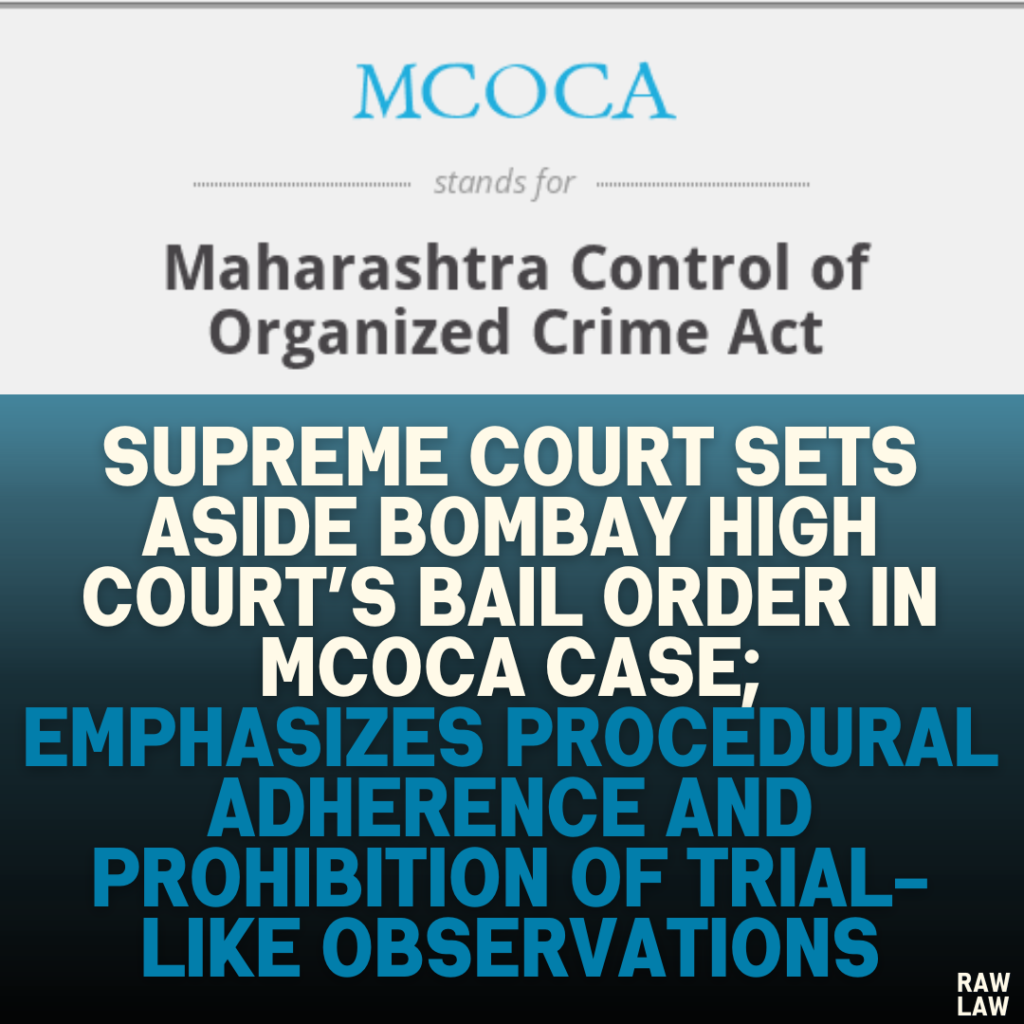Court’s Decision:
The Supreme Court of India overturned the Bombay High Court’s order granting bail to two accused in a case under the Maharashtra Control of Organized Crime Act (MCOCA). The Supreme Court ruled that the High Court failed to consider the mandatory conditions under Section 21(4) of MCOCA. The matter was remanded to the High Court for fresh consideration with instructions to ensure compliance with statutory requirements. The accused were allowed to remain on bail with the same conditions until the High Court revisits the matter.
Facts of the Case:
- Background of the Dispute:
- The case involved a long-standing civil dispute over a parcel of land in Pune between the deceased and the accused.
- Accused Nos. 1 and 2 appointed Accused No. 3 as their agent to handle litigation related to the property.
- Incident Leading to the Case:
- On October 5, 2020, the deceased attended a hearing at the Collector’s office in Pune. While leaving, he was shot dead by Accused No. 4 near the State Bank of India.
- Initially, charges were filed under the IPC, Arms Act, and Maharashtra Police Act. Later, MCOCA charges were added through a supplementary charge sheet alleging the involvement of an organized crime syndicate.
Issues Raised:
- Did the High Court properly apply the stringent requirements under Section 21(4) of MCOCA in granting bail?
- Were the High Court’s observations regarding the roles of the accused prejudicial to the prosecution’s case during the trial?
Petitioner’s Arguments:
- Procedural Lapse: The High Court made trial-like observations on the merits of the case, which were beyond the scope of a bail hearing.
- Violation of MCOCA Provisions: The court failed to consider the twin conditions under Section 21(4) of MCOCA, which require:
- Satisfaction that no prima facie case exists against the accused.
- The accused will not commit any further offense while on bail.
- Prejudice to Prosecution: Observations made by the High Court about the accused’s alleged roles were inappropriate and could deprive the prosecution of a fair trial.
Respondents’ Arguments:
- Delay in MCOCA Charges: MCOCA provisions were added much later to ensure non-grant of bail.
- Prolonged Custody: The accused had been in custody for over three years before being granted bail, showing no risk of absconding.
- Adequate Bail Conditions: The conditions imposed by the High Court were stringent enough to prevent the accused from fleeing or interfering with the trial.
Analysis of the Law:
- Section 21(4) of MCOCA:
- This provision imposes strict conditions for granting bail in cases involving organized crime.
- The court must be satisfied that no prima facie case exists and that the accused is unlikely to commit further offenses.
- High Court’s Procedural Overreach:
- The High Court delved into the sufficiency and admissibility of evidence, which is inappropriate at the bail stage.
- Observations like “the accused did not directly or indirectly deal with the deceased” are tantamount to findings that can prejudice the trial.
- Supreme Court’s Reference to Precedents:
- Ramesh Bhavan Rathod v. Vishanbhai Hirabhai Makwan (2021):
- The Supreme Court reiterated that courts must strictly adhere to statutory conditions for bail under special statutes.
- The Court distinguished cases involving constitutional violations, noting that no such grounds were raised here.
- Ramesh Bhavan Rathod v. Vishanbhai Hirabhai Makwan (2021):
Precedent Analysis:
- Observations Resembling Trial Findings:
- The Supreme Court emphasized that bail proceedings are not the stage for detailed evidentiary analysis or conclusions.
- Such observations could influence the trial court unfairly.
- Role of Stringent Bail Provisions:
- Statutes like MCOCA and PMLA have stringent conditions for bail to address the gravity of offenses.
Court’s Reasoning:
- Improper Observations by High Court:
- The High Court’s findings on the roles of the accused resembled conclusions on the merits of the case, violating procedural propriety.
- For example, the High Court concluded that Accused Nos. 1 and 2 were not in contact with the gang leader, which prejudges their role.
- Failure to Apply Section 21(4):
- The High Court did not adequately consider the twin conditions under MCOCA for granting bail.
- The focus should have been on whether a prima facie case existed, not on the sufficiency of evidence.
- Prejudice to Prosecution:
- The Supreme Court noted that the High Court’s order could impair the prosecution’s ability to conduct a fair trial.
Conclusion:
The Supreme Court set aside the High Court’s order and directed a fresh hearing on the bail applications. It instructed the High Court to:
- Focus strictly on compliance with Section 21(4) of MCOCA.
- Avoid making trial-like observations on the merits of the case.
- Ensure an expeditious decision, preferably within one month.
Implications:
- Significance of Procedural Compliance:
- The judgment reinforces the importance of adhering to statutory conditions under special laws like MCOCA.
- It highlights the need for judicial restraint during bail hearings.
- Fair Trial Concerns:
- The ruling protects the prosecution from prejudicial observations that could impact the trial’s fairness.
- Expedited Bail Process:
- By setting a timeline for the High Court’s decision, the judgment ensures timely adjudication.



